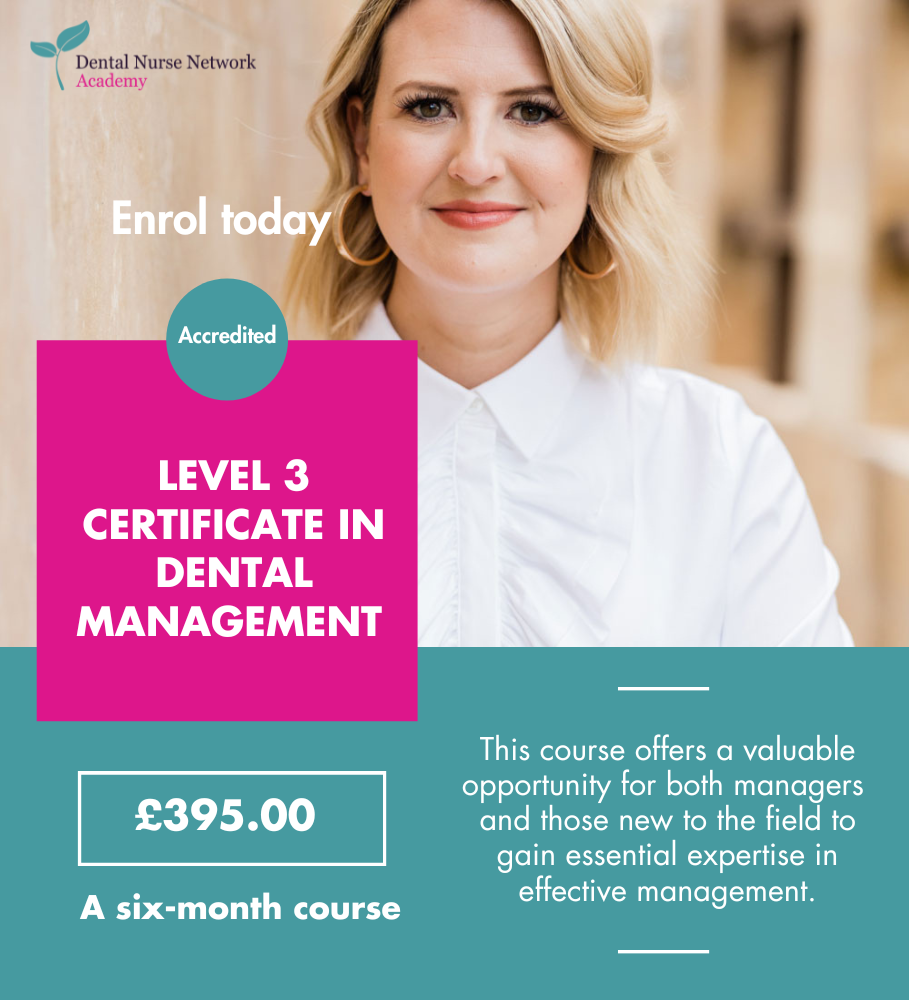 I have wanted to be many things in my life. But a dental nurse? It had never even come close to being one of my top ten career ideas. The start of my journey was unplanned and a complete surprise – but it was also the best decision I ever made. It went from being a role I didn’t even know existed, to being a part of my life and identity.
I have wanted to be many things in my life. But a dental nurse? It had never even come close to being one of my top ten career ideas. The start of my journey was unplanned and a complete surprise – but it was also the best decision I ever made. It went from being a role I didn’t even know existed, to being a part of my life and identity.
It all began back in 2014, with an application for what I thought was a receptionist role at a dental practice. I soon discovered it was actually a dual role of receptionist/trainee dental nurse, and I was very nearly put off because I had no idea what it would entail. Thankfully, after some research, asking questions, and undertaking an informative interview, I knew that this was something I wanted to do – it was a world I wanted to be part of and a career that I wanted to build on.
When talking to new dental nurses who are just entering their trainee journey, I always ask them what made them opt for this role. Why dentistry? Why nursing? I want to know what has drawn them into the industry; what has enticed them to start. Some are following in the footsteps of their peers, or else it’s something that has always interested them. Others just don’t know – they are just like I was when I started out. And I tell them the same thing that I would tell the younger me if I ever met her – dental nursing is a job you can fall into, and it is a job you will never want to leave. There are opportunities aplenty for those who want them, and so many pathways available that it’s a career in which you’ll never be ‘stuck’ at one stage. I’ve known nurses go on to become dentists, dental hygienists, treatment co-ordinators, trainers, and – like me – practice managers.
The training, like any training you go through, has its challenges, but you’ll find that the team around you can be so supportive and helpful because they have all been there too. They know what it’s like to learn all the annotations, the sciences, the infection control procedures. They know the tips and tricks to help you remember the materials, the instruments, the treatment set-ups, and the ways that you can improve your performance. It’s not a lie when people say that your dental team will become like your second family, because you have to work so closely together; you have to support each other so much that it is impossible not become closer than close.
There may be times where it’s not a bed of roses, just like in any job and any industry, but all times – bad and good – are learning curves. Whether it’s a tricky treatment that you can’t get your head around, or a complication that you just didn’t see coming, the bad times are there to teach you how to handle the role in the future. We learn from events, we document them, and we add them to our experience so we can improve and enhance our way of working. It can be easy to get caught up in the ’bad day’ cycle but, ultimately, those bad days just mean you’re learning something new – something that builds your career even more.
And what if you get bored? Or want to move on? Well, some nurses will take extra courses – impression-taking, fluoride application and radiography to name but a few. Others will look for a change of role, but will remain within the dental field. For me, it was undertaking a Bachelor of Science Open Degree with the Open University during my early years of dental nursing – a bit of a leap, I know, but it was something I had always been interested in and, as they say, the time is going to pass anyway, so why not? Dental nursing can be flexible enough to offer hours that work around studies and exams; studying on further training and courses – regardless of what they are – will only serve to improve your set of skills and experiences.
Undertaking further learning helped me to fine-tune my time management and organisation skills – both of which are crucial in the dental industry. I also found that there were aspects of my course which could be transferred to my job, even though my degree was not dentistry-related. By undergoing further training, I was able to understand the balance of workload, the importance of having external interests, and the ways in which courses can improve skill sets even if they aren’t a direct line to your field. If a non-dental course was this useful, then imagine how much better a dental one could be!
Once I finished my degree, I began exploring the different practice roles and looked for the opportunity to advance up the career ladder. I started at my first NHS practice in 2014 as an apprentice and qualified in 2016. From there, I moved to another (but busier) NHS practice, where I became head nurse, took on new responsibilities and expanded my knowledge and experience. I left there in 2018 to join a smaller private practice, where I was the lead nurse. After two years, I became the practice manager. At each practice I did something new, something valuable, and the experience I gained helped to prepare me for what I ultimately wanted to become – the manager of a practice.
My role now consists of the work that interests me most. I was open and honest with my employers at my annual review and told them the type of progression I was after, and we realised that our plans aligned perfectly. They trusted me to manage the practice in their stead, to lead the team, and to complete the paperwork, the maintenance, and the other odds and ends that come with the day-to-day running of the practice. I’m happier now in my role than I have ever been, and the work I do suits my mind and way of thinking, but it also challenges me and keeps me learning something new every day.
My journey as a dental nurse has been fascinating and ever-evolving, and I am excited to see what the future holds. After all, there are a lot of things that can be said about dentistry as a field – it is challenging, ever-changing, patient-focused, and many other things besides – but one thing you can never say is that it’s boring.
Author: Natasha Garthwaite BSc, RDN


